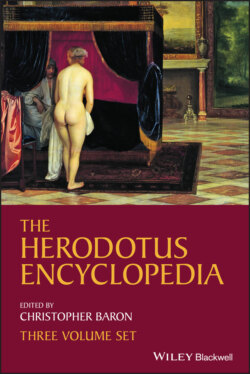Читать книгу The Herodotus Encyclopedia - Группа авторов - Страница 840
ARCHAIC AGE
ОглавлениеA series of violent political upheavals characterized the seventh century. Around 632, a popular Olympic victor named CYLON attempted to take over Athens as tyrant (Hdt. 5.71; Thuc. 1.126; Plut. Sol. 12, 17). He and his supporters occupied the Acropolis, but the Athenians surrounded his forces, who sought sanctuary at a statue of ATHENA. The magistrates promised clemency if they surrendered, but instead slaughtered them at the urging of the leaders of the influential Alcmaeonid family (Plut. Sol. 12; Fornara and Samons 1991, 1–24).
Cylon’s surviving partisans carried on a feud against the ALCMAEONIDAE in a conflict so violent that the entire city teetered on the brink of civil war (Plut. Sol. 12). Finally, in 621/0, the Athenians appointed Dracon to quell the STASIS ([Arist.] Ath. pol. 4; Plut. Sol. 17). The result was a LAW code famous for its harshness, which only worsened the strife (Stroud 1968; Gagarin 1981). In 594/3, the Athenians appointed SOLON as mediator, with a particular mandate to address the growing conflict between the aristocrats and the common people over inequities in landowning practices (Plut. Sol. 25; [Arist.] Ath. pol. 5–10; Hall 2014, 214–20).
Solon’s first reform, known as the seisachtheia, or "shaking‐off of burdens," canceled debts and abolished debt‐slavery. He also reformed the court system, giving all citizens the right of appeal, and created a council of 400, to which each of the four ancestral tribes contributed 100 members. He then divided the citizens into four classes based on agricultural wealth and passed wide‐ranging legislation relating to public and private matters, which he published on rotating, white‐washed cylinders called axones in front of the Royal Stoa in the Agora ([Arist.] Ath. pol. 7; Plut. Sol. 23; Leao and Rhodes 2015; Ruschenbusch 1966; Stahl and Walter 2009, 143–49).
Solon’s reforms were unpopular—the poor were dissatisfied because they wanted Solon to redistribute land in addition to canceling debts, while the rich were unhappy because of the losses they sustained in the seisachtheia. Solon left town under uncertain circumstances, and the city devolved once more into political chaos for almost three decades (Hdt. 1.29; [Arist.] Ath. pol. 11–13; Plut. Sol. 25–29).
